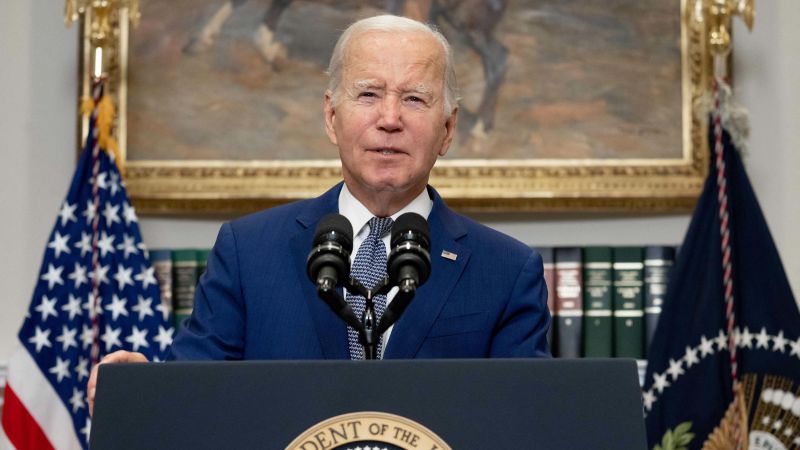President Joe Biden on Friday acknowledged he’s facing an unwelcome political obstacle: The disarray engulfing his political opponents has only made it more difficult for his message to break through.
Biden this week used his White House appearances to highlight his record in office as a sober contrast to the dysfunction on Capitol Hill, from the strong economy to easing student loan debt to tackling national security matters. The President’s chaos vs. stability arguments have perhaps no better illustration than the events of the past week, when Republicans thrust the House of Representatives into turmoil by ousting their own speaker while at the same time Biden’s most likely 2024 rival was sitting in a courtroom in New York for a civil fraud trial.
Yet on Friday, as Republicans squabbled amongst themselves over whether to televise an internal leadership debate, Biden seemed frustrated at a question over why people don’t feel better about an ostensibly roaring economy following a strong jobs report.
Biden replied by saying news coverage often focuses on the negative. But he also conceded the chaotic state of Washington left many Americans with a sour taste.
“Let me put it this way,” he said. “If you just watch what happened last week in the Congress, how excited are you gonna be about much of anything?”
In other words: Dysfunction in Washington may provide a nice contrast, but no one is really winning when nothing’s getting done.
For Biden, whose argument for reelection hinges in part on continuing the significant legislative accomplishments of his first term, a paralyzed Congress amounts to a double-edged sword. The turmoil may be entirely the fault of Republicans, but the appearance of dysfunction only creates more disillusionment for a public already skeptical of Washington politics.
Biden aides recognize they will have to negotiate with whichever Republican wins the gavel in order to avoid a government shutdown and secure funding for Ukraine. And Biden himself remains eternally hopeful of bipartisan breakthroughs, often to the eye-rolling of younger, progressive Democrats.
As Republicans jockey for leadership roles, the White House doesn’t believe it will help much for them to weigh in on the party’s selection process, and in fact would probably backfire if it became clear who their preferred candidate was.
“Whomever the House speaker is I’m going to try to work with. They control half the Congress and I’m going to try to work with them. There’s some people I imagine it could be easier to work with than others. But whoever the speaker is I’ll try to work with,” Biden told reporters Friday.
For now, the White House plans to seize upon the dysfunction for as long as it lasts.
“Less than one week ago, the House GOP attempted to singlehandedly shut down the American government unless they could make severe cuts to small businesses, manufacturing, law enforcement, and border security, while raising health care and housing costs,” White House spokesman Andrew Bates said Friday. “When the government remained open, for the good of all Americans, they turned on each other and made the only chamber of Congress they control dysfunctional.”
“Now, nearly a week since they unseated the Speaker of the House, congressional Republicans still can’t get their act together,” he said.
The two declared candidates for the speakership, Reps. Jim Jordan of Ohio and Steve Scalise of Louisiana, each have their own history with the Biden White House. Jordan is leading an impeachment inquiry into Biden while Scalise has served in GOP leadership.
Perhaps of most acute importance for the president, however, is their differing stances on providing aid to Ukraine, a top priority for the currently-nonfunctioning House. A pro-Kyiv group that grades Republican lawmakers on their support for Ukraine has assigned a B grade to Scalise, who has voted for previous assistance packages. It assigned Jordan an F, the lowest grade, pointing to his previous votes against Ukraine funding.
Biden this week said he would soon deliver a “major speech” on Ukraine, hoping to argue to the public “it’s overwhelmingly in the interest in the United States of America that Ukraine succeed.”
White House officials wouldn’t disclose much else about the speech, including when Biden planned to deliver it, but one official said it would likely occur only after the House elects a new speaker.
The president’s decision to speak to the American public about Ukraine is somewhat fraught. While support for Kyiv has so far been a bipartisan imperative, any cooperation with the White House would appear to come with significant peril for Republicans in Congress, who watched their leader driven out this week after partnering with Democrats to keep the government open.
Yet supporters of Ukraine have increasingly called on Biden to better make the case for sustained US support, worried that Americans who rallied behind Kyiv at the start of war may soon question why tens of billions of US dollars are still needed in a conflict that doesn’t appear to have an endgame.
Until a new speaker is elected, Biden’s team hopes to highlight how he is working to advance his agenda apart from Congress. This week, the White House sought to stay focused on policy developments – with the president making announcements on reducing student debt and the anniversary of the Americans with Disabilities Act while also making appeals for continued aid for Ukraine.
On Friday, he sought to harness a monthly jobs report that almost doubled forecasters’ expectations to emphasize the strength of the economy, an area he’s tried for months – without much success – to use for political gain.
“We have the highest share of working-age Americans in the workforce in 20 years. It’s no accident. It’s Bidenomics,” he said from the Roosevelt Room, employing the branding term that’s divided some Democrats concerned about the wisdom of taking credit for an economy that many Americans still view negatively.
White House officials have been steadfast in trying to highlight the broader economic progress since the height of the pandemic and when inflation had soared to record highs. And a senior administration official told CNN the White House is optimistic consumer spending will remain strong, despite skyrocketing interest rates, plateaued prices, and a restart of student loan payments for the first time in three years.
Gas prices remain one of the data points that White House officials are watching most closely and with heightened sensitivity. Top Biden advisers continue to believe that prices at the pump have the power to shape economic optimism and pessimism more than most other price tags that Americans regularly confront.
Last week, oil prices topped $94 a barrel for the first time in over a year, raising concerns that could eventually push up gas prices and inflationary pressures across the board.
But since then, oil prices have dropped precipitously – welcome news for White House officials hoping that this could help prompt a steady decline in gas prices, particularly as the country fully transitions out of a peak-driving summer season.
Any indication that prices are falling is welcome news at the White House, where attempts to sell a strong economic recovery have faced persistent headwinds. Polls show Americans remain pessimistic about the financial outlook, even though hiring is strong and inflation has eased.
There appears little sign the White House is retiring the “Bidenomics” branding that it devised earlier this summer in a bid to take more credit for improving economic conditions. One senior Democratic aide argued that recent discussions over whether the “Bidenomics” branding has been an effective messaging tool entirely missed the point.
Biden has “no other choice but to own the economy,” the person said, “but it won’t be about whether the label was good or not.”
Having hundreds of thousands more people earning a paycheck certainly helps. Following the release of Friday’s jobs report that showed the US economy added 336,000 jobs in September and adding 119,000 more jobs in July and August than expected – far surpassing expectations – one White House official reacted that the latest numbers were “stunning. In a good way.”
In his speech, Biden took the opportunity to sharply admonish House Republicans as the clock ticks toward another government funding deadline, this one days before Thanksgiving.
“It’s time to stop fooling around. House Republicans, it’s time for you to do your job,” he said. “So, let’s get to work for the American people, they’re waiting and they’re watching.”
Read the full article here





